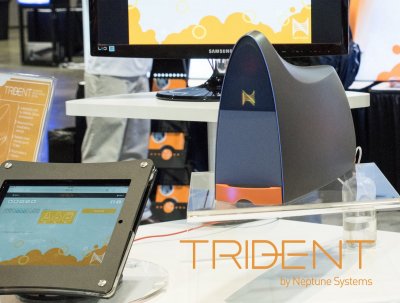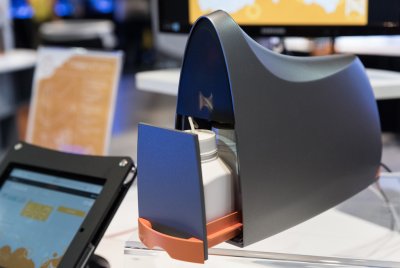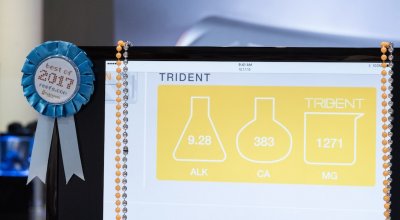Last Friday at our 5th Annual MACNA MeetUp we announced a future product, the Trident.
The Trident is based on a alkalinity testing technology we acquired from Jim Welsh a few months after MACNA 2016 and, with Jim's continued help, we have made incredible leaps forward from just testing Alkalinity. The Trident automates the testing of Alkalinity, Calcium, and Magnesium.
There have been many questions and rumors since we announced last week. In this post, I will provide you with as much information as I can as it stands now, regarding the Trident. Please understand that a number of things either have not yet been decided, or we have yet to finish final testing and do not want to put something out there that we may later need to retract.
So here is the FAQ for the Trident as it stands today:
What does the Trident measure?
The Trident was designed for reefkeepers. It tests for the three things that are the building blocks of coral skeletons in our reef tanks (and what our customers have been asking about for years): Alkalinity (dKH), Calcium, and Magnesium.
What are the connections?
The Trident connects to your Apex via a 1LINK connection, or via the AquaBus with an external power supply. It also has two tubes out the back, one to draw sample water from your tank, and the other to send waste to a container or a drain.
Does it have a pH probe inside?
No, the Trident has no pH probe inside that might require frequent calibration.
How does it work?
The Trident basically automates the proven method that you (and scientists) already know and use - Titration. Since the Trident uses micro-drops delivered via a stepper-motor driven peristaltic pump along with an electric eye, we have taken the human element out of the equation.
So, how accurate is it?
The Trident produces amazingly consistent results. Alkalinity is +/- 0.05 dKH and both Calcium and Magnesium are +/- 15ppm
How long will the reagent last?
The default testing schedule is 4x Alkalinity tests per day and 2x Magnesium and Calcium tests per day. At that rate the reagents will cost about $20/month. That's a per test cost less than any other test kit on the market today.
Can I test more or less frequently than that?
Yes, within limits. There are operational limits on both ends. Obviously the test takes time so only so many can be fit in a day. Also, once unsealed, the reagents will have a more shortened lifespan. That said we are fairly confident that you should be able to run less tests and get two months out of one set of reagents.
How much will the reagents cost?
Reagents will be ready-to-use (nothing to mix up), sold in two-month kits and cost ~$40.
How much tank sample water is taken?
Compared to products that only do alkalinity testing, the Trident uses very little tank water for its samples and produces very little waste. While most testing systems shown to date create 50-90ml of waste per test, the Trident produces under 22ml of waste for all three tests (Alk, Ca, Mg).
Is the Trident a standalone system?
No, the Trident requires the latest Apex to operate. However, the Trident does not require any external devices like dosing pumps and does not require any outside vessels for reagent or rinse water.
Why won't the Trident work with the previous Apex models like the Apex Classic?
With the advancement of technology, many times the resources available in prior systems is just not adequate for new devices. We see that with iPhones, gaming consoles, TVs, and many other devices in our lives. There are two key reasons why the Trident will not work with the Apex Classic. 1. Every Apex system must contain the working software for all the devices in the ecosystem. More complicated devices like the Energy Bar 832 and the Trident take up a great deal of code space. More than that is available on the previous Apex models. 2. The Energy Bar 832 and the Trident require more computational horsepower to operate than what is available in the now 10-year-old-designed Apex Classic hardware.
But you said that you would not leave Apex Classic owners behind?
And we haven't. Since the new Apex was released last year, we have developed a new module (FMM) and many more features in the Apex Fusion cloud service that everyone can take advantage of. At the time of launch last year I said that the only device at that time that would not work was the Energy Bar 832 and that nothing else was in the works at that time - but something could come along. And it did - subsequent to MACNA last year. And remember, we even made the COR compatible with the Apex Classic.
Will the new Apex Base Unit be available separately?
At this point our demand for complete Apex Systems is so great that we cannot shift the supply to selling the Apex Base Units on their own. This may happen down the road, but customers should realize that the value in getting a complete new Apex System will always be greater than buying the components individually. The new Apex System also comes with the advanced Energy Bar 832 and a set of our new double-junction probes that many customers might need to replace anyways. And remember, the new Apex is backward compatible with all of your existing Neptune Systems products.
How big is the Trident?
When we designed the Trident we wanted to make it as self-contained as possible. This meant that we wanted all the hardware and all of the reagents to be contained under a single, attractive enclosure. No tubes going this direction or that. No bottles to have to hide. We were able accomplish this in a space of just 4"W x 10"H x 12"D. The Trident should fit nicely under the stands of most aquariums. We intend on having an optional wall bracket available as well.
How much will the Trident cost?
No firm pricing will be released at this time, but we are committed to bring this to market between $500 and $600.
When will it be available?
We hope to have units in the hands of our Neptune Systems Insiders by the end of Q1/2018 and have it available to the general public in Q2/2018.



The Trident is based on a alkalinity testing technology we acquired from Jim Welsh a few months after MACNA 2016 and, with Jim's continued help, we have made incredible leaps forward from just testing Alkalinity. The Trident automates the testing of Alkalinity, Calcium, and Magnesium.
There have been many questions and rumors since we announced last week. In this post, I will provide you with as much information as I can as it stands now, regarding the Trident. Please understand that a number of things either have not yet been decided, or we have yet to finish final testing and do not want to put something out there that we may later need to retract.
So here is the FAQ for the Trident as it stands today:
What does the Trident measure?
The Trident was designed for reefkeepers. It tests for the three things that are the building blocks of coral skeletons in our reef tanks (and what our customers have been asking about for years): Alkalinity (dKH), Calcium, and Magnesium.
What are the connections?
The Trident connects to your Apex via a 1LINK connection, or via the AquaBus with an external power supply. It also has two tubes out the back, one to draw sample water from your tank, and the other to send waste to a container or a drain.
Does it have a pH probe inside?
No, the Trident has no pH probe inside that might require frequent calibration.
How does it work?
The Trident basically automates the proven method that you (and scientists) already know and use - Titration. Since the Trident uses micro-drops delivered via a stepper-motor driven peristaltic pump along with an electric eye, we have taken the human element out of the equation.
So, how accurate is it?
The Trident produces amazingly consistent results. Alkalinity is +/- 0.05 dKH and both Calcium and Magnesium are +/- 15ppm
How long will the reagent last?
The default testing schedule is 4x Alkalinity tests per day and 2x Magnesium and Calcium tests per day. At that rate the reagents will cost about $20/month. That's a per test cost less than any other test kit on the market today.
Can I test more or less frequently than that?
Yes, within limits. There are operational limits on both ends. Obviously the test takes time so only so many can be fit in a day. Also, once unsealed, the reagents will have a more shortened lifespan. That said we are fairly confident that you should be able to run less tests and get two months out of one set of reagents.
How much will the reagents cost?
Reagents will be ready-to-use (nothing to mix up), sold in two-month kits and cost ~$40.
How much tank sample water is taken?
Compared to products that only do alkalinity testing, the Trident uses very little tank water for its samples and produces very little waste. While most testing systems shown to date create 50-90ml of waste per test, the Trident produces under 22ml of waste for all three tests (Alk, Ca, Mg).
Is the Trident a standalone system?
No, the Trident requires the latest Apex to operate. However, the Trident does not require any external devices like dosing pumps and does not require any outside vessels for reagent or rinse water.
Why won't the Trident work with the previous Apex models like the Apex Classic?
With the advancement of technology, many times the resources available in prior systems is just not adequate for new devices. We see that with iPhones, gaming consoles, TVs, and many other devices in our lives. There are two key reasons why the Trident will not work with the Apex Classic. 1. Every Apex system must contain the working software for all the devices in the ecosystem. More complicated devices like the Energy Bar 832 and the Trident take up a great deal of code space. More than that is available on the previous Apex models. 2. The Energy Bar 832 and the Trident require more computational horsepower to operate than what is available in the now 10-year-old-designed Apex Classic hardware.
But you said that you would not leave Apex Classic owners behind?
And we haven't. Since the new Apex was released last year, we have developed a new module (FMM) and many more features in the Apex Fusion cloud service that everyone can take advantage of. At the time of launch last year I said that the only device at that time that would not work was the Energy Bar 832 and that nothing else was in the works at that time - but something could come along. And it did - subsequent to MACNA last year. And remember, we even made the COR compatible with the Apex Classic.
Will the new Apex Base Unit be available separately?
At this point our demand for complete Apex Systems is so great that we cannot shift the supply to selling the Apex Base Units on their own. This may happen down the road, but customers should realize that the value in getting a complete new Apex System will always be greater than buying the components individually. The new Apex System also comes with the advanced Energy Bar 832 and a set of our new double-junction probes that many customers might need to replace anyways. And remember, the new Apex is backward compatible with all of your existing Neptune Systems products.
How big is the Trident?
When we designed the Trident we wanted to make it as self-contained as possible. This meant that we wanted all the hardware and all of the reagents to be contained under a single, attractive enclosure. No tubes going this direction or that. No bottles to have to hide. We were able accomplish this in a space of just 4"W x 10"H x 12"D. The Trident should fit nicely under the stands of most aquariums. We intend on having an optional wall bracket available as well.
How much will the Trident cost?
No firm pricing will be released at this time, but we are committed to bring this to market between $500 and $600.
When will it be available?
We hope to have units in the hands of our Neptune Systems Insiders by the end of Q1/2018 and have it available to the general public in Q2/2018.



Last edited:









